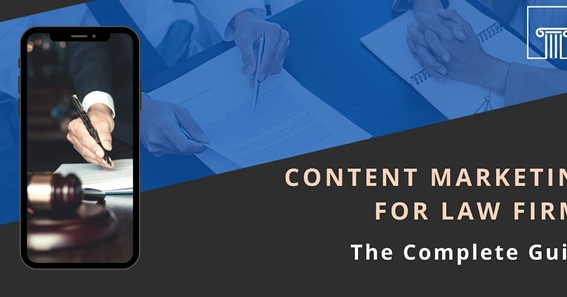Twenty years ago, TVs, yellow pages, billboards, and mailers were the primary means of lawyer advertising.
But with more and more people searching for legal information on the internet than ever before, depending on these channels will not be enough for law firms looking to maximize their reach.
So, how can law firms stand out from the crowd and ultimately attract more clients? This will only happen through compelling and strategic law firm content marketing.
What Is Content Marketing?
Content marketing refers to creating and publishing content to attract potential clients. While traditional advertising methods focus on selling, content marketing provides relevant information that builds brand authority and recognition.
The goal is to create content that focuses on the client’s needs, whether answering a question or guiding them through the different aspects of their claim or lawsuit.
Ultimately, content marketing for law firms should build trust with potential clients by drawing them into their brands.
Several types of content help achieve this goal, including but not limited to:
- Practice area pages
- Blog posts
- Landing pages
- Infographics
- Press releases
- Videos
By utilizing more than one form of content marketing, you can establish your law firm as a trustworthy and reliable resource for potential clients.
Click here – 6 perks of joining the best technical analysis course
How Can Law Firm Content Marketing Help Attract Potential Clients?
At a glance, content marketing for law firms may seem like a shallow form of advertisement. However, statistics show otherwise.
According to the Content Marketing Institute, businesses that adopt content marketing to advertise their goods and services have conversion rates six times higher on average than those that do not.
That is because modern consumers like to feel connected to businesses before they seek their services. This is especially true for law firms since their clients’ problems are often life-changing and stressful.
As a result, content marketing offers something that advertisements and paid search alone cannot—it creates a deep trust between your practice and potential clients. That connection through targeted, useful content gets quality leads in the door.
Enables Law Firms to Target their Ideal Clients
There are lots of different ways to establish a connection with your ideal clients using content marketing. However, building your content around ideal client personas is the most common and effective method.
Personas are specific, fictional representations of the kind of clients you want to serve. For law firms, it is usually best to create a persona for each practice area you serve. While some may have overlapping psychographic or demographic information, it can help differentiate content down the line. Be sure to include information like:
- Age
- Location
- Sex
- Education
- Work experience
- Family structure
- Hobbies
This data is the basis of your content marketing strategy and plays a vital role in topic selection, keyword research, etc. You know your clients and potential clients better than anyone, so use that information to your advantage.
Increases Website Visibility on Search Engines
When potential clients search for an answer to their question, they will use a search engine like Bing or Google. In addition, they are likely to click on the first link they see.
So, how do you get your law firm to the top of search results? This practice is what is known as search engine optimization, or SEO.
SEO is probably the most elusive aspect of content marketing. This is because search engines update their algorithms frequently, changing their evaluation standards for content relevance.
However, some basic principles help rank your website and associated content higher on search engines.
Publishing authoritative content, using keywords in content, and creating unified business listings can help improve search ranking if done properly.
Helps Turn Website Traffic into Quality Leads
When potential clients click on your content, they will look for answers to their questions. For instance, if someone is searching for “Wyoming car accident statute of limitations,” your content should provide the answer.
However, it is also a chance to briefly show the unique qualifications of your firm, whether that is board certification, years of experience, ratings, results, or testimonials. While these should not clash with the topic of your content, they often help convince potential clients to call and set up a consultation with your firm.
Generally, conversions are most likely to happen when the readers find your law firm through an organic search rather than a paid ad. Also, organic search leads are usually much higher quality than paid ads.
The Importance of Helpful Content for Brand Authority and Recognition
Quality is better than quantity when it comes to law firm marketing. To create an authoritative online presence, it is essential to produce relevant, transparent, and informative content. This not only affects your law firm’s reputation with potential clients but also affects your search ranking.
Search engines such as Bing and Google look at specific pieces of data to determine the quality of content versus comparable content from other sources.
In some cases, these other sources can be your competitors. Since this evaluation is based on the search intent of your potential client, your content should be:
- Accurate — If you mention any laws or statistics, ensure to link to reputable sources. This helps build authority and ensure the integrity of your law firm.
- Specific — Avoid general content topics or fluff (i.e., car accident claims vs. how to file a car accident claim in Wyoming).
- Readable — Edit and proofread your content for grammar, spelling, and readability. Try keeping sentences under 25 words and dividing content sections into headings and subheadings.
Combining these practices can bring targeted traffic to your firm’s website and convert them into quality leads. That is the power of helpful, targeted content.
A Step-by-Step Overview of Content Marketing Strategy

A good content marketing strategy is vital in helping law firms get more clients. Every firm has its challenges, so a one-size-fits-all approach will not work.
Instead, focusing on pain points and the specific results you want to see is important.
Do you want higher-quality leads?
Do you want to increase search engine rankings?
Do you want to improve your firm’s presence in local listings?
Here’s a step-by-step overview of creating a great content marketing strategy:
1. Set Content Marketing Goals
Some of the primary goals of creating a content marketing strategy is to create brand awareness, improve organic rankings, get organic traffic, and generate leads and new clients.
You need to choose one or more from these goals and then rely on relevant metrics to measure your progress.
2. Understand Your Audience
To provide relevant and informative content, you need to know your audience.
Who are they?
And more importantly: What are they looking for?
This is critical information.
You need to thoroughly understand your target audience, their needs, wants, hopes, challenges, and the kinds of legal services they are after so you can be able to tailor your offerings to them.
3. Conduct Keyword Research for the Best SEO Results
Keywords are the key to all of this. To perform search engine optimization – creating content that the search engines like and respond to – you must know the right keywords.
Most people would type these phrases and words into search engines when looking for the services you provide.
For law firm content marketing, the keywords might be something like “divorce lawyer in [your city]” or “[your city] real estate attorney.”
Have a session where you and your team brainstorm about the most likely terms people will use to find your services. Bounce around ideas. Most of these will be obvious.
If you do criminal law in Wyoming, “criminal lawyer in Wyoming” would be on your keyword list. So would “defense attorney Wyoming,” “criminal attorney Wyoming,” and all the various permutations.
4. Create Valuable Content
Remember that all this aims to provide value and not just throw keywords around. You want to give them information and answers to their questions.
You want prospective clients to see you as a leader in your industry. You want them to stay on your website, share with others, and return later.
And you do not want them to feel duped by visiting your site.
The content you come up with must be good. You want it to be as relevant, comprehensive, useful, and compelling as possible.
5. Distribution and Publication
Once your content is done, you should post it to your website and various marketing channels. This includes all your firm’s social media accounts. You can also link to other authoritative websites.
Backlinks are an essential part of SEO for law firms that want to rank highly in competitive markets. There are many ways to build an impactful backlink, including:
- Sponsorships
- Scholarships
- Local promotions
- Guest posts on legal blogs
This is when you determine the best distribution channels for your law firm based on your budget and goals.
6. Evaluating Performance
After a few months, once you have a few contents live on your website and distributed, it is time to evaluate your performance. You can use these key metrics to evaluate performance:
- Number of new cases
- Leads generated (phone calls, conversions)
- Uplift in organic rankings
- Increase in organic traffic
- Increase in referring domains (and links)
- Number of content pieces published
You can rely on third-party SEO tools such as Ahrefs or SEMRush for tracking key metrics related to your content marketing. But it is better to set up Google Analytics (GA) at the beginning of your content marketing efforts.
Conclusion
Without a robust library of content to back up your website, it is unlikely that you will receive quality leads that turn into loyal clients. By consistently curating high-quality content, you will help establish your firm as a trustworthy source in your community and garner more business.
If you want to adopt content marketing as part of your overall marketing strategy, remember that it is a long-term investment.
Anyone who promises immediate results is not being honest. Building a great brand that ranks highly on search engines takes consistency and time.
Click here – 2022 Guide To Loan Forgiveness Guide For Devry Students





